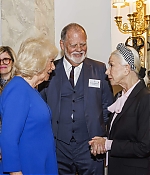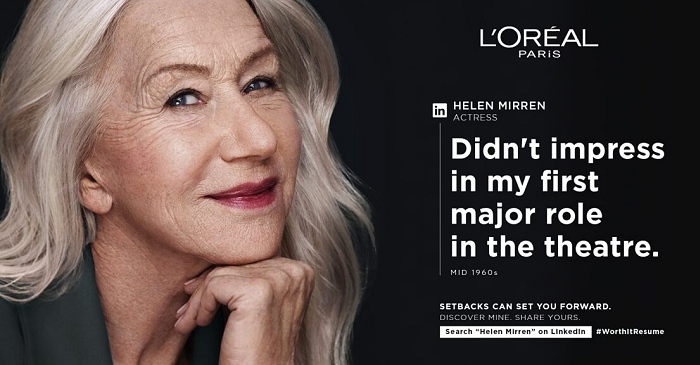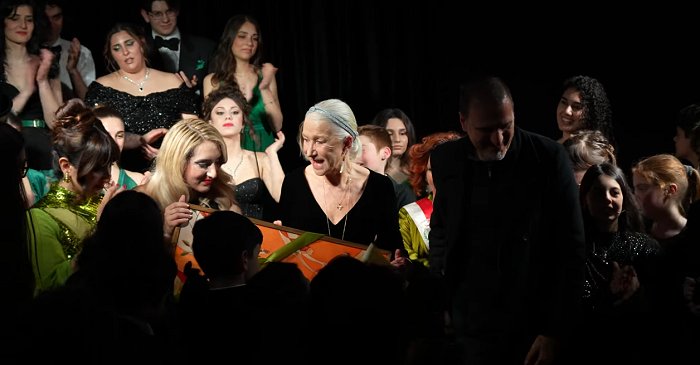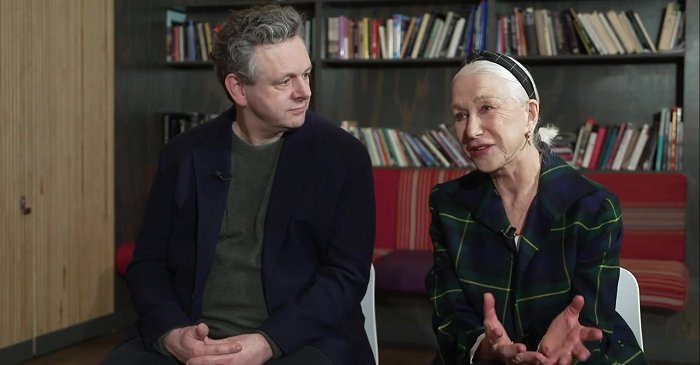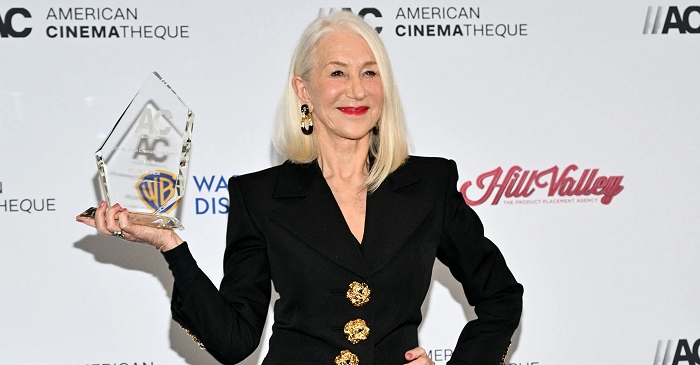
|
Welcome to The Helen Mirren Archives, your premiere web resource on the British actress. Best known for her performances with the Royal Shakespeare Company, "Prime
Suspect" and her Oscar-winning role in "The Queen", Helen Mirren is one of the world's most eminent actors today. This unofficial fansite provides you with all latest
news, photos and videos on her past and present projects. Enjoy your stay.
|
Celebrating
10 years
on the web
|
Tags
|

She was a virgin until she was 18. But Dame Helen Mirren soon made up for lost time. Here, in our first extract from her new autobiography, she talks frankly about the many men in her life
Although my parents had a happy and successful marriage, I never had any desire or ambition for marriage or children. I love children. I find them funny and inspiring. And I think people like my parents, who sacrifice personal freedom and economic wealth for the well- being and happiness of their children, are the true heroes of our society. But I just did not want that. I loved my life of freedom, and of work. I also loved the men I had the good fortune to share my life with. They made me laugh, and I think they loved me, and I will forever be grateful for that. However, I did not want to marry them. This was my view of men and marriage until I was 52. My mother Kit, an East Ender who had left school at 14, had impressed upon my sister Kate and me the need to have a qualification, to go to university and to become economically independent women. In her day women were given no real alternative to marriage and motherhood, but it was not something she ever recommended for us.
Suitors of ours were not welcomed at our home in Southend- on- Sea, on the Essex coast. My beloved father Basil, a poorly paid, low- level civil servant, did not want to share his daughters and was, I suspect, madly jealous, while my mother was terrified that we would succumb to romance, get married and close down our lives too early. She would, therefore, find truly nasty things to say about anyone we had the temerity to bring home. In my case, she was totally successful for, ahead of my generation by about 30 years, I never had, as I have said, the slightest inclination to marry. It seemed to me like voluntary imprisonment. Despite the obstacles, I went out with a young Frenchman called Jean- Louis who came to Southend to learn English. But it was not until I left home to go to teacher training college in London when I was 18 that I found sex – or rather, sex found me. It was not a wonderful discovery, nor one sought out by me. It became, indeed, the source of much heartache as I experienced the calumny of young men. I had arrived in London an innocent in mind and body, with very romantic notions that somehow sat side by side with my vehement feminism. This turned out to be a lethal mix. My trustful romantic nature was badly let down, my feminism confronted. I felt worthless and shamed, and became suspicious, hurt and angry until I found someone who really cared for me. I am still p***** off, actually.
In my final year as a teaching student at the New College of Speech and Drama, however, I had the good luck to meet and go out with – and stay in with – Ken Cranham, a fellow actor from the National Youth Theatre, which I’d joined when I was still a schoolgirl in Southend, and continued to be involved with at college. It was Ken who restored my self- esteem and romantic tendencies. We loved each other. I found a person who shared my interests, and introduced me to more. He was so lovely to me, and I am indebted to him. He saved me from a terminal rage. His family were kind- hearted and welcoming. His mother often cooked us a delicious Sunday lunch that was gratefully received. He and I would also dream about going to a good restaurant and ordering separate dishes. As students we had so little money we had to go to the cheapest places and share one bowl of the least expensive item on the menu. When Ken left RADA, the illustrious drama school, and landed a job in a West End play, he immediately took me to a posh Chinese restaurant, where we ordered more than one dish. It was fabulous. Ken, like all the men I have had a proper relationship with, left me a better person than he found me. I remember going with him to Leicester Square at three in the morning to watch Muhammad Ali beat Sonny Liston on the big screen. It was an amazing night. Strangely, all my guys have loved boxing, good food and good music. We would also queue up for seats in the gods at the Old Vic theatre and see Laurence Olivier and Joan Plowright, Maggie Smith, Frank Finlay and Geraldine McEwan in legendary performances. Ken once queued all night for a ticket to see Olivier playing Othello, a famous performance. He got the ticket and then slept through the whole thing because he was so tired.
In my third year at the Youth Theatre I was asked to play Cleopatra. I had yet to overcome a toxic mix in myself of a great physical shyness and a palpable physical presence. I was in an environment full of testosterone, and chaotic male hormones, and the word sexist had not yet been invented. I was in at the deep end. I loved the power and passion of that role and, of course, it’s always good to be a queen, as I would later find out. This was the role that launched my career, and confirmed my decision that, after all, teaching was not for me. After a few early professional roles, I was invited in my mid- 20s to join the Royal Shakespeare Company. It was a tremendous opportunity, although the work was often gruelling. Sometimes we would rehearse one play in the morning, perform another play in the afternoon and another one at night – all great pieces of literature. It was at this time that my relationship with Ken came to an end after several years together, unable to withstand the pressure of my putting work before love. It was also during this period that an article appeared in a Sunday supplement labelling me ‘ Stratford’s very own sex queen’. That headline was to haunt me for the next 20 years. I shall never forgive the journalist involved.
I think it was in my second year at Stratford that I met up with a group of people who would become very good friends for the rest of my life, and who lived at a curiously named house called Parsenn Sally, on the outskirts of the town. It was an amazing place: a house shared by friends, something like a cross between a country weekend for toffs, an artists’ convention and a travellers’ camp. There was constant dressing up, animals everywhere, champagne occasionally and, if not, gallons of wine, games of wit and lots of music. The boys loved dressing in drag, and the girls as nuns or tarts. There were also drugs, of course, marijuana, mostly. Sex was private and personal, and almost always between established partners. There was a sweetness and kind of prudish innocence about it all. It was irresistible. A picture from those days reveals my one and only acid trip, a walk in the country. I am laughing already. And the end result is clear to be seen in another photograph – an unscheduled commune with nature.
The late 1970s, as I turned 30, brought a further step forward in my career, when I was given the role of Nina alongside Joan Plowright in Chekhov’s The Seagull. I had heard it was a good role, but I hadn’t actually read the play when we started rehearsals. I always find plays and scripts very difficult to read, and besides, I am terminally lazy. Before rehearsals began, the cast met to read the play in Joan’s lovely London flat. During the discussion I said innocently, ‘ I wonder if Nina and Tregorin have an affair?’ Joan turned her blackberry eyes in horror upon me. ‘ Have you read the play, Helen?’ she said. Consummate professional that she was, and married to the greatest living actor, Laurence Olivier, she must have thought that the younger generation was going to the dogs. She had a point. When I look at the amount of work I did at that time, I am amazed I managed to fit it all in. I was not only working in the theatre in Stratford and by then in London, but being offered film roles as well. It was also during this period of my life that I met and fell in love with James Wedge. James was a successful fashion and beauty photographer, one of the wave of London- born cameramen of the late 1960s and early 1970s. He was self- educated, brilliant, funny and very artistic, and his photography was gorgeous. Together he and I worked on photoshoots that were nothing to do with publicity or fashion. They were our own private pictures. It was the perfect antidote to the work I was doing in the theatre. Another antidote was James’s cottage in the Forest of Dean, in Gloucestershire. James, the archetypal city boy, must have had rural roots, I think. He was a superb gardener and dry- stone wall builder, and taught me both. I had never gardened before and soon became obsessed, reading all I could get my hands on. I still like to go to bed with a gardening book, reading up on the best soil for amaryllis, how to grow peonies and what insects attack broccoli. Those days with James I count as some of the happiest in my life.
On Saturday nights he would pick me up from whichever theatre I was at and we would set off for the forest. By 1.30am or so we would be out in the garden, checking to see if the carrots had grown yet. I still miss that cottage and that part of the world. Another place that became very dear to me is Ireland, where I made three of my most important films, and along the way had a wonderful relationship with an Irishman, Liam Neeson. He was from Northern Ireland, and had grown up Catholic in a very Protestant town, Ballymena, home town of Ian Paisley. When Liam took me to meet his family, I was terrified. I was so wrong for Liam, in every way: I was British, I was irreligious, and I was older than him. I needn’t have worried. His family was welcoming and gracious, and I became very close to them. With Liam I visited Northern Ireland often and saw the great beauty of the place. I also saw the difficulties related to the British occupation. Tanks rolling down the road were an everyday occurrence, and walking home one night from a restaurant, Liam and I were shadowed by an armed soldier, either protecting us or suspicious of us, you never knew. I was to live with Liam for four happy years.
By 1982, when I was in my late 30s, the Thatcher years had taken hold in London and every restaurant in Parsons Green, where I had bought a house with two old friends, seemed to be full of braying young male City types in pinstripe suits, drunkenly throwing food at each other. I did not like the direction my country and my city were going, so that when the director Peter Hyams asked me to play the Russian captain of a spacecraft in 2010, a film to be shot in Los Angeles, I jumped at the chance. In Los Angeles I was given the keys to a brand new Mustang convertible and a second set to an apartment off the Sunset Strip. I was in heaven. Los Angeles was a real education, and one of the lessons I had to learn very quickly was that Americans did not go in for the kind of theatrical swearing I was used to. The C word is absolutely the pits in America. No word is worse. Whereas in the theatrical culture I’d come from it’s almost a term of endearment.
I learned how appalling it is to utter this word on set one day. My co- star Roy Scheider was joking around and said something to make me laugh. I did, and the director called, ‘ Cut!’ As an amused throwaway, I turned to Roy and said, ‘ Oh Roy, you c***!’ The whole studio froze in horror. Roy looked utterly shocked, whereupon I dug myself in deeper and deeper. ‘ Oh no! Oh, I didn’t mean you c***, I just meant, you know, you c***,’ I offered. Roy forgave me, I hope. Later I tried to explain the disgusting nature of luvvie lingo in Britain. I was sad when filming came to an end, and I had to give back all the keys. Determined to stay on in Los Angeles, I rented another Mustang, only old this time, and moved in with a girlfriend. And then I got the call to meet a director who was preparing a film about Russia, White Nights. His name was Taylor Hackford. I’d already had a few meetings like this in Los Angeles and had found them very intimidating. There is a completely different attitude there to a film audition. It’s a town, don’t forget, where every waitress and barman wants to be a film star, so you are supposed to be incredibly grateful that you have been given an audition at all. So off I went to meet Taylor Hackford, already slightly resentful and cross.
And then he’s late, and I am waiting in his office, glaring at the girl behind the desk. I am insulted. If I can get there on time, then he most certainly can, I think. Fifteen minutes go by. I think, ‘ Okay, I’ll wait for 20 minutes in total. That is the cut- off point.’ A further five minutes go by and I stand up to leave, telling the alarmed secretary that I’m off. I walk to the door, and as I reach for the handle, Taylor walks into the room, and into the next two decades of my life, and counting. Up until this point in my life I’d had a recurring nightmare about getting married. I would be walking down the aisle, big dress, veil, church full of well- dressed people, knowing that in some hotel there was a vast, expensive banquet arranged, knowing it was a horrible mistake but not being brave enough to say so. All my relationships had taken second place to my work, the fun of it and the intensity of it and my ambitions within it. I’d continued merrily along this path, having a series of relationships that had all the requirements of passion and lust and domesticity and tears and laughter and love, until I met Taylor. By then I was in my late 30s, and he just a few months older. It was certainly not love at first sight. After our first meeting in Los Angeles, I would have taken a hefty bet against it if someone had suggested that this was the man I would complete my life with. First, I had never had a relationship with a director in all my years of work. Somehow that was off limits to me. I could not see how to work properly under those conditions. Also, more important, Taylor was married, with two children from two different marriages. But as soon as the film started, and then as it progressed, our attraction to each other became a clear and unavoidable force.
Taylor’s strength, which he shares with many film directors, is his positive nature, and his ability to press forward against all odds. One of his faults, albeit usually a charming one, is his precipitous nature. After a separation of six months or so, when I returned to Britain in the hope of putting some distance between the two of us, Taylor turned up in London. With much pain, he had separated from his wife. My fate was sealed. My first years in Los Angeles as Taylor’s partner were very difficult for me. Once he had made that complicated decision to take me on board, I felt that for the first time in my life I should put my relationship before my work. It was the least I could do. The geographical distance between our two homes and families meant something had to give if this was going to succeed, and I did not want yet another wonderful- but- only- four- years- long relationship. Taylor had made major changes in his life for me, and I thought I should do the same. I arrived in LA, was driven to our new home in the Hollywood Hills, in which we were to live with Taylor’s older son Rio, who was 15 at the time, and then I was introduced to the concept of joint custody as far as his second son, Alex, was concerned. It was a whole new world for me, utterly alien and fraught with difficulty. I had no experience with children and I had absolutely no profile in Hollywood as an actress, despite my appearances in a couple of films. There are never that many roles for women, and whatever roles there were inevitably went to actresses with a bigger Hollywood profile than me.
The people who ultimately got me through the anxiety, the embarrassment and my feelings of awful displacement were Taylor’s sons. They were always kind to me, and ultimately loving. My arrival in their world had caused upheaval and pain. Yet they gave me sympathy and courtesy from the beginning, and I loved them. I also loved Taylor for putting his sons above me. I loved a man whose primary concern in life was his responsibility towards his children. With the help of the boys, Taylor and I grew to understand how to live together, and eventually to work parallel to each other, but we still did not get married for many years – 14, to be exact. Marriage was simply not a necessity for us. I had achieved the aim, impressed upon me by my mother, of being economically independent. I always kept my home in London, and as the years went on most of my work was in Britain, while Taylor’s was in America. He always gave me the same freedom to work as I did him, and that, of course, is one of the many reasons we are still together. Taylor can be turbulent, irrational and explosive. He has made me cry on many occasions. Coming from a family where voices were not often raised, the conflicts sometimes were unbearable. I am non- confrontational, a scaredy- cat where that is concerned. Taylor has no fear of confrontation, which makes me cringe in British embarrassment.
He is also the most unsexist man, looking women directly in the eye with no curtain of assumptions or prejudices to cloud his view. He is brave, loyal and supportive. He is the man to turn to in an emergency, and has been a wonderful mentor to many people. He is neither jealous of success nor impressed by it, although he enjoys it and celebrates it. He is understanding and sympathetic to failure. He also tried to teach me, not altogether successfully, not to be afraid of the phone. In the end, with our two families becoming very close, there was no longer any reason for us not to be married. And anyway, the estate laws of both our countries preferred us to be married. So we decided to do it – and set a date a mere six weeks away. The wedding finally took place on 31 December, 1997, in a small and simple church in Ardersier, a little fishing village near Inverness – Taylor has Scottish roots, so it seemed highly appropriate. Nearly ten years on, my family now consists of my husband, Taylor, the president of us all; my sister Kate, the queen of us all; her son and his family, my brother Peter’s son Basil and Taylor’s sons, my stepsons. Lots of boys, and my very happiest moments are when I am together with all of them, which happens quite often. We are an international family, with deep roots on both sides of the Atlantic. I am often asked where I consider to be home, and really I have no answer. I am first and foremost a London girl, or an Essex girl, but my home nowadays is wherever this motley clan collect, and become as one.

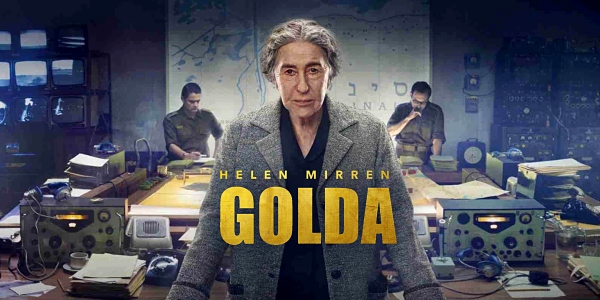 Available on home video Directed by Academy Award winner Guy Nattiv, Helen Mirren portrays the responsibilities and decisions that Golda Meir faced during Israel's
Yom Kippur War in 1973 |
|
Releases October 04, 2024 (USA) Feature film directed by Marc Forster | |
|
In pre-production Season 2 created by Taylor Sheridan |
|
|
Announced Feature film directed by Anton Corbijn |

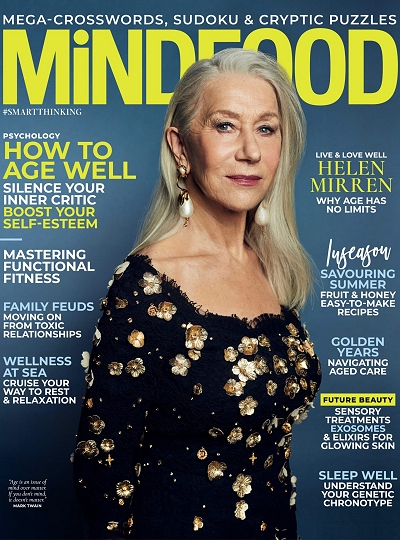
Mindfood Magazine (New Zealand) March 2024 |

Vanity Fair (Italy) December 29, 2023 |

Posted on April 11th, 2024
|
Posted on March 29th, 2024
|
Posted on March 19th, 2024
|
Posted on March 7th, 2024
|
Posted on February 16th, 2024
|


